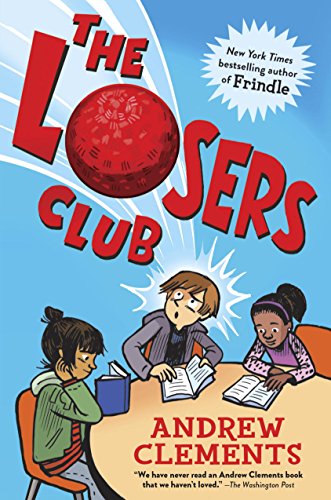![]()
School stories are an important genre of middle grade literature. Kids can relate to issues with teachers, friends, bullies, crushes, siblings, and parents — and all of these elements are easy to incorporate into a realistic novel in a school setting.
Andrew Clements knows how to write these novels well, and his latest — The Losers Club — is no exception. I think there should be a subset of school stories called books for kids who love books. That’s what this book is. There are other elements, including sports and crushes and family issues, that make it a general read, but at the core, it’s a love letter for kids who love to read.
Alec would rather read than do almost anything. In fact, he does read instead of doing a lot of things, like listening to his teachers and participating in class discussions. Word has gotten around at his school, so his 6th grade teachers are keeping a close eye on him, making sure that he is not reading when he’s supposed to be working. He even gets sent to the principal for reading. Trying not to read makes his first day of 6th grade exhausting. He misses that mental break.
Another new element in Alec’s school year is that he and his younger brother are going to the after school program since his parents, who used to work at home, now have to drive into an office. The first day he almost forgets as he rushed to his bus line, so he could finally crack open a book, until his younger brother comes to remind him.
Well, at least he can tuck away in a corner for the two hours he is waiting to be picked up and finally read and relax, right? Wrong! The program director tells him that he can’t just sit on the bleachers in the gym. He needs to be involved. He has to choose to participate in one of the clubs (origami, LEGO, robotics, Chinese), Active Sports, or Homework Club (where the only reading he would be allowed is that assigned by school). He asks about a reading club, and the director tells him that anyone can start a club with permission and one other member, and she thinks a reading club would be a great idea.
The problem is that Alec doesn’t really want a lot of people in the club. People mean noise, and he just wants quiet and the ability to read by himself, so after he recruits someone to join, he starts “The Losers Club,” because who would want to be a member of a club with that name? Well, it turns out that people do. The club grows, and his little brother even starts one in the room for the lower grades.
Alec is still bothered when his frenemy Kent refers to him as Bookworm, but he’s happy. He’s able to focus on school during the day and mostly able to read after school. It wouldn’t be a good story without growth and conflict, and there’s plenty of that here — a little bit of a love triangle, flying kickballs (illustrated on the cover) coming from the Active Games corner, and parental negotiations.
It has been a while — several months at least — since I’ve read a middle grade novel, and this hit the spot. It was funny and sweet and realistic. No one was pigeon-holed. Alec wasn’t just a bookworm, and Kent wasn’t only a jerk. The story moved along well and had twists and turns along the way that kept me engaged.
